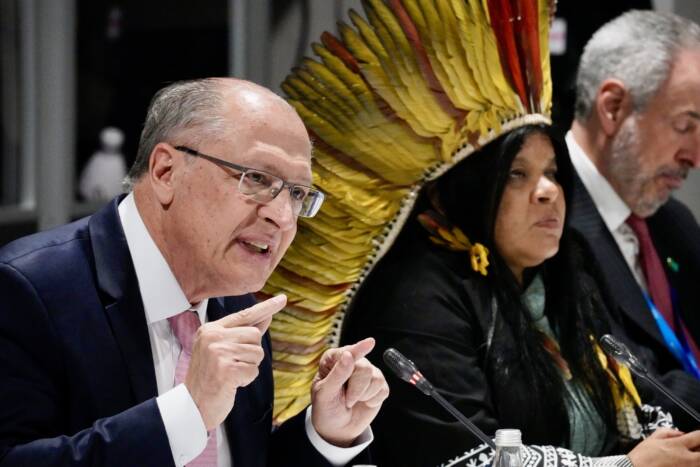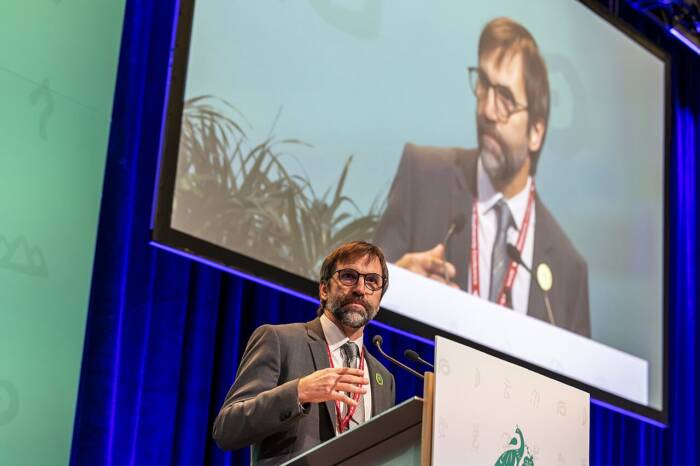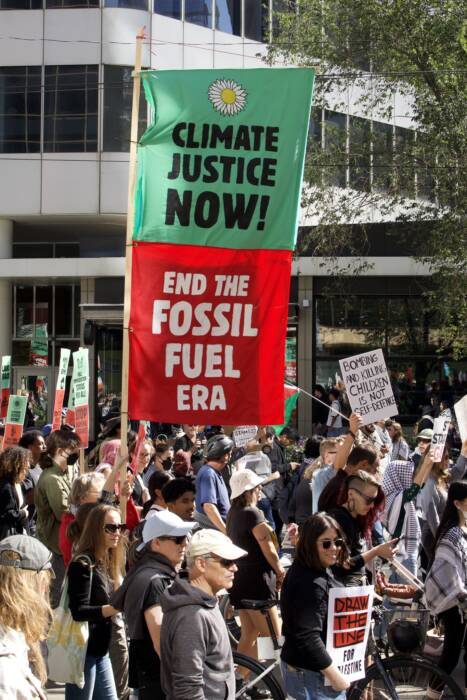Here we are, ten years after the Paris Agreement was signed. Monday is Day 1 of COP30, held in Belém, Brazil, and we want to give you some easily accessible information and analysis amidst the chaotic mess of headlines that will be flying around.
This is the first of four dispatches that we’ll be sending out over the next month. We’ll include a roundup of the main issues leading up to, during, and after COP, and we’ll bring in the voices of experts on the ground. We’ll also include some ways to take action on these issues.
We hope you find these updates helpful! And we welcome your feedback at any time, so please reach out! In this issue:
- COP30 – What’s at stake?
- COP30 Peoples Summit
- 2025 Federal Budget analysis
- Fair Shares resources
- Ways to take action
1. COP30 – An uphill climb and an opportunity for movements
This year’s COP will see countries review their “Nationally Determined Contributions” (voluntary commitments required under the Paris Agreement), and try to inch closer to a true implementation of the Paris Agreement.

Vice-Presidência da República, CC BY 2.0, via Wikimedia Commons
Last year in Azerbaijan, we saw the COP negotiations arrive at a hard-fought but ultimately disastrous agreement on climate finance. Instead of a $1.3 trillion annual contribution from Global North countries to the Global South by 2035 – a figure widely agreed upon by experts, social movements, and most governments – the parties eked out a commitment for $300bn USD per year by 2035. In the final, painful hours of the conference, Canada joined other negotiators from the US, Australia and others in watering down the text and blocking real ambition.
Despite some modest steps forward, there’s no denying that we’re seriously behind on our climate commitments. Here’s a brief overview of what to look for in the upcoming COP30 negotiations, and what we can advocate for as civil society:
A new climate finance commitment from Canada
Canada has been taking very moderate steps forward on its climate finance commitments. In the last five years we achieved a new climate finance commitment of $5.3bn from 2021-2025/2026 under then Environment Minister Steven Guilbeault. This is money earmarked to support the Global South in the global energy transition. While our obligation under the Paris Agreement calls for a much higher commitment, the $5.3bn figure was a tiny step forward.
This year, Canada upheld its international commitments by submitting its Nationally Determined Contribution (NDC – essentially our climate commitments for the next five years) on time, far ahead of many countries. Unfortunately, the NDC itself was short on details and did not include a new climate finance commitment.

UN Biodiversity, CC BY 2.0, via Wikimedia Commons
In Belém this year we’ll be watching for an announcement of a new financial commitment from Canada for the period of 2026-2030.
Eyes on the Global South and the demands of vulnerable people
The Global South – and the most vulnerable people within it – are the frontlines of the climate crisis. Movements of the South have led the charge on many of the most important climate wins of the last few decades – from Loss & Damage to fossil fuel resistance.
The unified voice coming from the most climate-affected communities says one thing very clearly: there can be no progress at COP30 without significant commitments to climate finance and debt cancellation.
Debt is an enormous burden that blocks real climate action and prevents most of the world from taking on an energy transition. Check out this great overview of climate finance and debt from Eurodad.
Multilateralism at stake
Recent years have seen multilateral institutions stretched, challenged and rendered powerless by nation states. These institutions failed to prevent or stop the Russian invasion of Ukraine or the horrific two-year genocide in Gaza. With the US redefining itself as an even more aggressive and uncooperative player, our international institutions are under grave threat. We need global cooperation for our collective wellbeing and to tackle the massive crises of climate and inequality. We must support the many calls for multilateral solutions to international crises, including a UN Convention on Sovereign Debt and a UN Tax Convention.
2. COP30 Peoples Summit
“Social and popular movements, coalitions, collectives, networks, and civil society organizations from Brazil have been, since August 2023, building a process of convergence among organizations and movements of women, trade unions, indigenous peoples, family farmers and peasants, quilombolas, traditional peoples and communities, African descendant traditional people, Black people, youths, inter-religious groups, environmentalists, workers, media activists, cultural organizations, students, from favelas and peripheries, LGBTQIAPN+ , people with disabilities, human rights defenders , defenders of children and adolescents, intergenerational groups, urban and rural areas, forests and waters, towards the realization of the People’s Summit as an autonomous space regarding the United Nations Framework Convention on Climate Change (UNFCCC) COP 30 to be held in the Amazon.”
This is an excerpt from the manifesto of the Peoples Summit, an independent space running parallel to COP30 that will serve as a convergence ground for resistance movements and those fighting for climate justice.

Grassroots summits like these often accompany the official COP conference, and are important places to step away from the glitzy greenwashing, the lobbyists and the numbing legalese of the conference proceedings. The Peoples Summit is a gathering where one can remember the real purpose of the climate movement: to stop climate catastrophe for all peoples, to stop the relentless extraction from the earth, and to find a new way of being that is rooted in Indigenous understandings of balance between all living things.
3. Budget analysis
It’s Budget Week! Check out the Climate Emergency Unit’s latest podcast analysing the recent federal budget with Alex Hemingway of the BC Society for Policy Solutions in conversation with Seth Klein and Anjali Appadurai.
We unpack Budget 2025 and its implications for housing, climate and austerity. We also discuss the economic tradeoffs within the budget and where money could have been spent or raised instead (hint: a wealth tax!). And of course, we had to chat about Zohran Mamdani and his historic win in New York!
Listen on Apple, Spotify or wherever you get your podcasts.
Also check out 350.org’s analysis of how the budget measures up to the demands of the Draw the Line campaign.

Photo by Tony DaSilva | 350.org
4. Fair Shares resources
There’s a lot of good work happening on Fair Shares around the world. Here are two resources to pay special attention to right now:
- Report: ‘We can pay for it’ by OilChange International: This report builds on a growing body of research that seeks to uncover all the ways that the Global North can unlock up to $6.6 trillion USD in public funds to help pay for the energy transition. Check out this impactful report here!
- Article: ‘Equity, climate justice and fossil fuel extraction: principles for a managed phase out’ by Greg Muttitt and Sivan Kartha: This article dives into the thorny issue of “equity” surrounding the phaseout of fossil fuels. Who is impacted the most by rapid decarbonization? Who can afford to decarbonize? What tools can we use to determine what’s fair and equitable when it comes to phasing out fossil fuels? Check out the paper here.
5. Taking Action
There are several ways to take action on issues of international fair shares. Here’s a list that we’ll keep adding to:
- Sign the Jubilee petition: Our friends at KAIROS Canada are part of the global Turn Debt Into Hope campaign, pushing for the cancellation of unfair debts against developing countries, and for the creation of a fairer global debt workout mechanism. Sign the petition!
- Forward the Fair Shares Platform (and this blog post!) to a friend: Canadians who care about the climate crisis must stay up to date on how Canada shows up in the international community. It’s part of tackling the crisis. Please spread the word about the Fair Shares Platform, and help us build a strong, united civil society voice around these issues.
- Tell us what you want to hear about: These newsletters (and the whole Fair Shares Project) are a resource for you! Reach out to us anytime to tell us what you want to learn more about, or who you’d like to see us do a podcast episode with. You can reply to this email or send us a new one at [email protected].